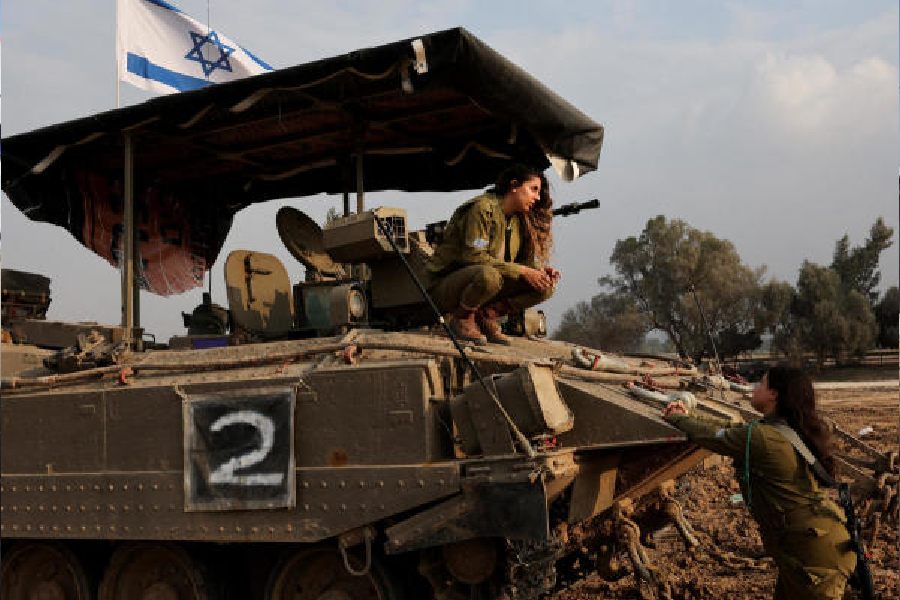When Captain Amit Busi gets a chance to sleep, she does so with her boots on — and in a shared tent in an improvised Israeli military post in the northern Gaza Strip.
There she commands a company of 83 soldiers, nearly half of them men. It is one of several mixed-gender units fighting in Gaza, where female combat soldiers and officers are serving on the front line for the first time since the war surrounding the establishment of Israel in 1948.
Busi is responsible not just for the lives of her subordinates — search-and-rescue engineers whose specialised training and tools help infantry troops enter damaged and booby-trapped buildings at risk of collapse — but also for the wounded soldiers they help evacuate from the battlefield. She and her soldiers also help scour the area for fighters, weapons and rocket launchers and are responsible for guarding the camp.
It can be easy to forget Busi is only 23, given the respect she has clearly earned from her subordinates — among them Jews, Druze and Bedouin Muslim men.
“The borders have been blurred,” Busi said of the decadeslong limits on the roles of female combat troops in Israel. The military, she said, “needs us, so we are here.”
Since Israeli ground forces entered Gaza in late October, women have been there fighting. Their inclusion has helped bolster the image of the army domestically after the intelligence and military failures of October 7, and amid global scrutiny of the campaign’s high civilian death toll. More than 24,000 Palestinians, many of them women and children, have been killed since the start of the war, according to Gaza health officials.
The integration of women into the military’s combat units has been the subject of a lengthy debate in Israel, home to one of the world’s few armies that conscript women at 18 for mandatory service. For years the question of women serving at the front pitted ultraconservative rabbis and religiously observant soldiers against feminists, secularists and critics of the country’s traditionally macho culture.
Now, that debate is effectively over.
There is no point continuing such arguments, Lieutenant General Herzi Halevi, the military’s chief of staff, said after female soldiers raced to confront Hamas attackers on October 7, because their “action and fighting” speaks louder than words.
Like other fundamentals of Israeli life, many of the preconceptions about women in combat were upended on October 7, when hundreds of Hamas-led gunmen surged across the border from Gaza into southern Israel, killing about 1,200 people, most of them civilians, according to Israeli officials, and abducting 240 captives to Gaza.
In the months since, the needs of the military have propelled societal change at breakneck speed. Same-sex partners of slain soldiers are now legally recognised widows and widowers, and at least one transgender soldier has fought on the front in Gaza.
Despite years of derision from conservative quarters of Israeli society, female combat soldiers have become symbols of progress and equality, appearing on magazine covers and featured in television news profiles.
A recent survey by the Israel Democracy Institute found that among the secular public, about 70 per cent of women and 67 per cent of men indicated support for increasing the number of women in combat roles.
In recent years, women have made up about 18 per cent of the military’s combat force.
“Everyone is using the phrase ‘The debate is over,’” said Idit Shafran Gittleman, director of the Military and Society programme at the Institute for National Security Studies at Tel Aviv University. “Everyone saw what happened on October 7,” she said, adding that “women contribute to security, they don’t decrease security.”
Israeli women were thrust into combat almost immediately on October 7. Two all-female tank crews, once the butt of sexist jokes, hurtled through the desert that morning to help repel waves of armed infiltrators from Gaza.
The female commander of Caracal, a mixed-gender infantry battalion, led a 12-hour battle along the Gaza border with two companies equipped with Lau missiles and machine guns. Together with the tanks, they helped block Hamas’ advance, saving several communities from attack.
“We stopped them, they didn’t pass us,” said the commander, Lieutenant Colonel Or Ben Yehuda, 34, a career officer and a mother of three, speaking at the battalion’s desert base near the Egyptian border, where her unit is usually deployed.










